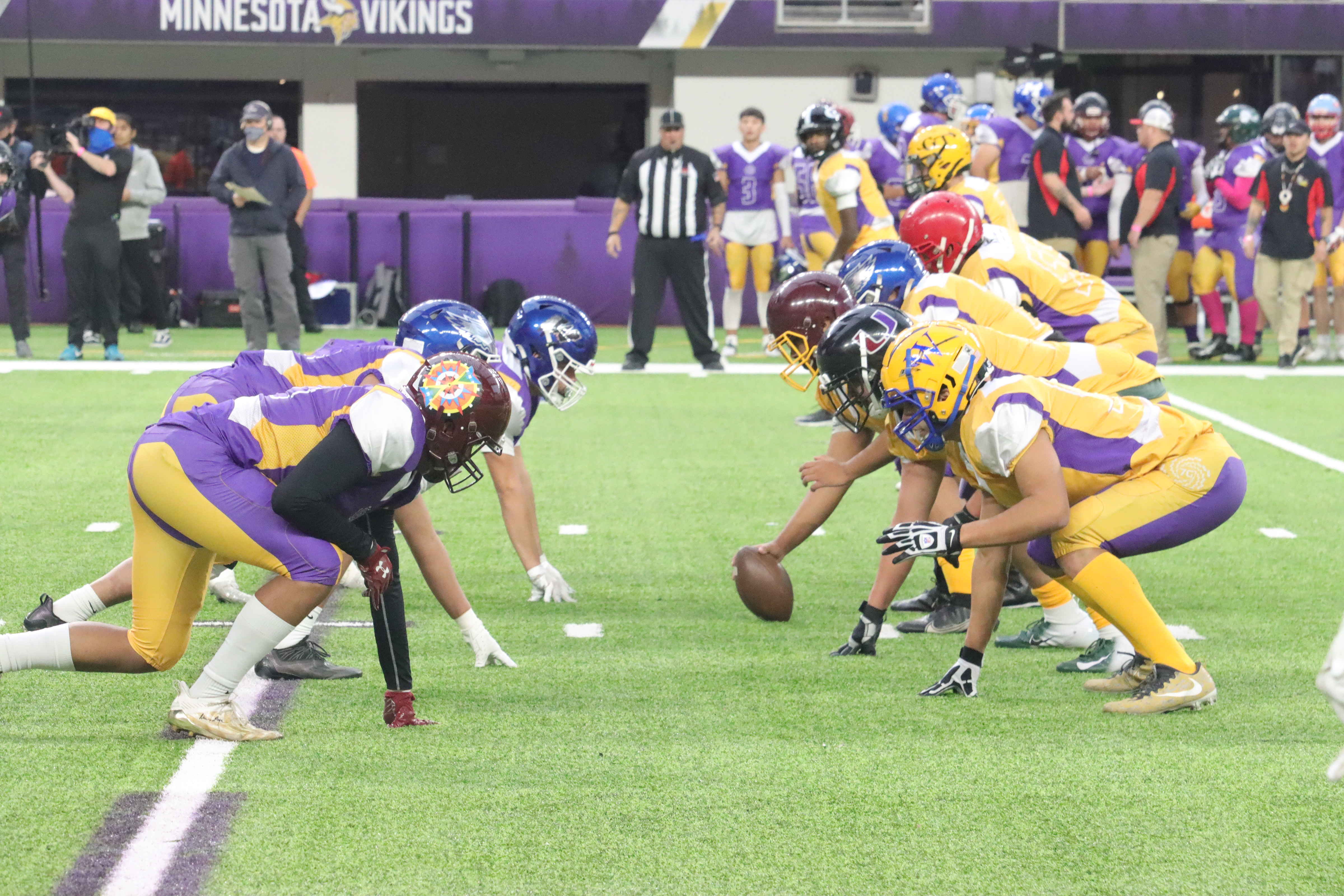
- Details
- By Darren Thompson
MINNEAPOLIS — On Sunday, the 4th annual Indigenous Bowl convened at the US Bank Stadium, home of the Minnesota Vikings, in downtown Minneapolis. Native American student athletes in their senior year of high school, recommended by their coaches to the 7G Foundation, along with their families and spectators from all over the country, traveled to Minneapolis to participate in a weekend of team-building and empowerment.
“As a Native woman and a mom, I’m super excited to be here, that we can host and showcase the best of our athletes, the best of our warriors, the best of our young men and families,” said Minnesota Lieutenant Governor Peggy Flanagan at the Indigenous Bowl banquet on Saturday. “This year has been incredibly difficult, for all of us, as we have been navigating through the last 20 months.”
Want more Native News? Get the free daily newsletter today.
Last year’s Indigenous Bowl was cancelled, like many other events, because of the coronavirus pandemic and organizers said they weren’t sure the event would continue. However, 7G, a nonprofit organization based in California, and the National Football League and the Minnesota Vikings decided to try to host the 4th annual event just 6 weeks ago.
It was the first Indigenous Bowl to be hosted outside of the Soboba Band of Luiseño Indians reservation near San Jacinto, California.
The event featured 54 Native American high school football players from more than 30 different federally recognized tribes from California to British Columbia, and many other states across the Midwest. It was the first time many student athletes left their state to get exposure to the professional sports industry.
“Indigenous athletes, starting at the Carlisle Indian School through Jim Thorpe, changed the game of football forever,” said University of New Mexico Assistant Professor Nick Estes during the banquet Saturday evening. Jim Thorpe was named All-American at the Carlisle Indian School twice and would go on to become an Olympic gold medalist, excel in basketball and baseball, and become the first president of the American Professional Football League, later known as the National Football League.
7G was founded by Bennae Calac, an enrolled member of the Pauma Band of Luiseño Indian of Pauma Valley, California, with the aim of developing Native leaders through education, athletics, culture and real-world support for the next seven generations. The organization’s biggest event each year is the annual Indigenous Bowl.
The game featured all Native talent, from singing the National Anthem by Oglala Lakota Sierra Bettleyoun to a halftime show by Little Earth Singers with a dance group. The game was announced by Ernest Stevens III, an enrolled member of the Oneida Nation of Wisconsin.
“It is a dream come true to participate in this event,” Bettleyoun told Native News Online.
“It was really amazing to be a part of this,” said Easton Laster, an enrolled member of the Oneida Nation of Wisconsin, of his participation in the Indigenous Bowl. “This was a dream come true.
The game was free and open to the public. Nearly 1,000 people watched the game. Players were divided up into two teams, Purple and Gold, with Gold winning 18-14.
“Everything went well this year. We were all so pleased with how our student-athletes were treated by the NFL, the Minnesota Vikings and the local community,” 7G Executive Director Bennae Calac told Native News Online. “We’re so glad we had all the support we had.
The event’s sponsors included the National Football League, the Minnesota Vikings, the 7G Foundation, Indian Land Capital Company, the Chickasaw Nation of Oklahoma, the Shakopee Mdewakanton Sioux Community, Onoo Po Strategies, McGuire Woods Consulting, Sevenstar Holdings, and others.
More Stories Like This
Zuni Youth Enrichment Project Takes Top Emerging Artist Apprentices to Phoenix for Artistic Exploration and Cultural ImmersionFrom Dishwasher to Award-Winning Chef: Laguna Pueblo's Josh Aragon Serves Up Albuquerque's Best Green Chile Stew
Rob Reiner's Final Work as Producer Appears to Address MMIP Crisis
Vision Maker Media Honors MacDonald Siblings With 2025 Frank Blythe Award
First Tribally Owned Gallery in Tulsa Debuts ‘Mvskokvlke: Road of Strength’
Help us defend tribal sovereignty.
At Native News Online, our mission is rooted in telling the stories that strengthen sovereignty and uplift Indigenous voices — not just at year’s end, but every single day.
Because of your generosity last year, we were able to keep our reporters on the ground in tribal communities, at national gatherings and in the halls of Congress — covering the issues that matter most to Indian Country: sovereignty, culture, education, health and economic opportunity.
That support sustained us through a tough year in 2025. Now, as we look to the year ahead, we need your help right now to ensure warrior journalism remains strong — reporting that defends tribal sovereignty, amplifies Native truth, and holds power accountable.
 The stakes couldn't be higher. Your support keeps Native voices heard, Native stories told and Native sovereignty defended.
The stakes couldn't be higher. Your support keeps Native voices heard, Native stories told and Native sovereignty defended.
Stand with Warrior Journalism today.
Levi Rickert (Potawatomi), Editor & Publisher
